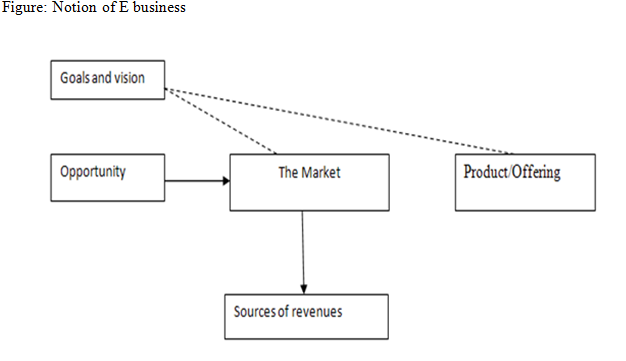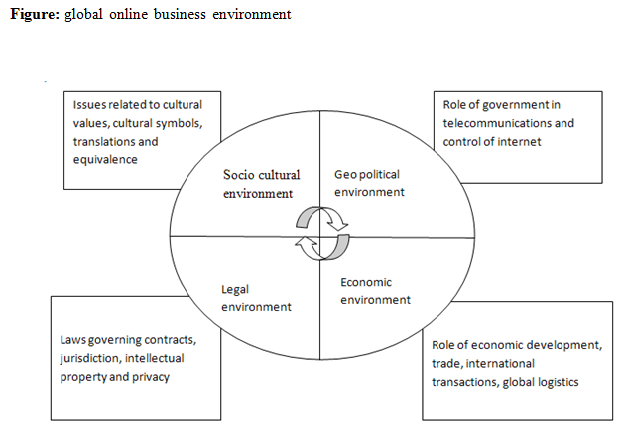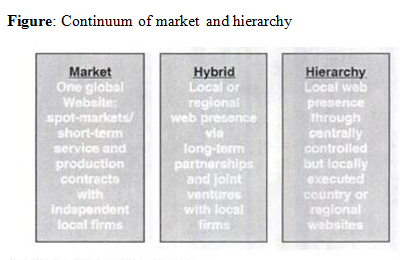Global E-Business (International Business)
Communication technologies have become advanced since last decade of the twentieth century that accelerated the process of globalisation. Presently most of the nations are ready for the electronic economy and to build e-business infrastructure. It is necessary for different countries to develop specialized e-business strategies that exploit their unique capabilities and resources, and even geographic positions. There is also a need for a variety of models for building e-business infrastructure and participating in global e-commerce. Global e-business is growing speedily and several trillion dollars are being exchanged annually over the web. Companies must assess global markets and broaden online in developed countries as well as in the emerging economies of other nations like China, Brazil, and India to exploit the technology of global e-business. Companies may proactively utilize global e-business opportunities and take benefits of e-commerce, or may implement a protective approach to new global competition that intimidates their business. Domestic businesses will progressively feel more pressure of international competition as e-business will offer companies a platform to fight at universal level.

The combination of telecommunications and computer technology has initiated business organizational system known as the internet that offered example of ecological business development. The internet symbolizes a new and important technology that has received more attention from academicians, entrepreneurs, business and investors (Sawhney and Zabin, 2002). The expansion of e-commerce, facilitated through the internet as a channel, suggests both the emergence of a new business environment, and the likelihood of catastrophic change within the previous environment. The emergence of the information age and the initiation of the internet have resulted in transformations and these outcomes forced companies to review their organizational models used to explain business management. Hannan and Freeman (1977) developed the basis of organizational ecology in an attempt to describe the existence of organizations. Since then, organizational ecologists have theorized that environmental pressures considerably impact the triumph of an organization with regard to its form, function, and overall strategy.
A critical assessment of the growth of e-commerce on the internet gives a distinctive opportunity to scrutinize the natural development of a business sector that was created and colonized over a relatively short time period. Clearly, the internet technology and its different manifestations such as e-commerce provide better opportunities for companies around the world to establish unique strategic advantages (Varadarajan and Yadav, 2002). Global e-commerce is basically about leveraging electronic networks to capture global markets, and it includes all transactions taking place in the worldwide electronic market space. Transactions between global purchaser and sellers can take the form of business-to business (B2B), business-to-consumer (B2C), consumer-to-consumer (C2C), business to-government (B2G), and other hybrid forms of transactions.
Theoretical Research on Global E Business
It is established that conventionally globalisation has made companies to expand, sell, the same product adopting similar strategy across the world. Currently due to advancement of internet technology, organizations can successfully sell worldwide. It has to adapt its web site linguistically, racially, and in all other ways accessible to the global customers. To effectively localize a web site, factors such as language, encoding, programming, graphic design, layout and spatial orientation, culture, customs, colour preferences, icons, symbols, currency, number format, measurements, date/time and other address fields must be taken into account in the web site design (Singh and Boughton, 2015). The country-environment also has a considerable impact on the process and execution of e-business activities, how opportunities are leveraged, and how hurdles are overcome. With in 10 years, whole industry has developed to assist companies design localized multilingual web sites and software applications for diverse cultures (Cyr and Lew, 2003). The localization industry also helps companies navigate the international e-environment by providing advice related to legal, logistical and other international problems. The academic management literature provides a comprehensive analysis of web site localization efforts (Cyr and Lew, 2003). Though there have wide research been done in the field of global e-commerce and it constitutes a growing area that grabbed attention from both practitioners and scholars, it is clear that the studies of global e-commerce is still at young stage. In growing research of best global e-commerce practices the study by Singh, Alhorr and Kim places localization-standardization debate, in international e-business as a prime theme for further investigation. This contemplation piece delves into strategic implications for global e-commerce strategies. The paper explained the concept of "adaptive strategies" to e-commerce practices in the international field to address the localization-standardization paradigm, which is a major debate. In two areas of research together, the global e-commerce and institutional theory viewpoints of organizational change and adaptation, adds a new dimension to the management literature of global e-commerce, and conforms to institutional theorists that organizations are adaptive systems attempting to match the complexities of their environments (Meyer and Rowan, 1977). Therefore, the paper presented by Singh, Alhorr and Kim suggests new insight in this important field by discovering the impact of external environment for strategic e-commerce decisions in international settings.
Another study done by Vyncke and Brengman provided comprehensive review of studies investigating the impact of cultural congruency of international websites on their efficacy. The study investigates whether companies actually need to create culturally harmonious websites in order to successfully reach different target countries. Van Slyke, Lou, Belanger and Sridhar adopted innovation adoption theory with the backing of theoretical studies on culture and information technology to scrutinize the issue of culture influences consumers' intentions to buy goods or services online. Zhu and Thatcher studied the development of global e commerce from an information ecology viewpoint. The writers conduct cross-country examination showing evidence for national information ecology exerting influences on a country's e-commerce adoption at different stages of e-commerce development. The study uses secondary datasets from the World Economic Forum's Global Information Technology Reports and the Economist Intelligence Unit's Global E-readiness Rankings. The study illustrates that at the initial stage of e-commerce, the helpful government policy and compatible culture value are influential facilitators for e-commerce dispersal at global level. As e-commerce becomes more widespread, e-commerce diffusion tends to be more business-driven and demands more legal certainties and protections. The study found that national information ecology, which is shaped by various institutional environment factors, put forth influences on a country's e-commerce diffusion at different stages of e-commerce growth. Their research findings have significant managerial and policy implications for global e-commerce expansion.
Other group of theorists like Martinez and Williams also studied the development of e-commerce in different nations based on competing theories, such as economic institutional theory and entrepreneurship theory. The research reports of numerous countries sample revealed strong support for the institutional argument and weak support for the entrepreneurship outlook. Their analysis confirms the institutional view that, ceteris paribus, the strength and reliability of the formal legal, political, and socio-economic institutions of a country exert a positive influence on its access to and use of the technologies that support e-commerce. Many theorists stated that through determined legislation, that allows private investment to prosper, governments can promote the acceptance of technologies that lay the foundation for economic wealth through e-commerce.
Research studies denote that companies must have to develop localized international sites so as to successfully communicate with and sell to international online viewers. Website localization is the process of adapting websites in accordance with the linguistic, cultural, technical, functional, legal, and other locale-specific requirements of the target market. Numerous studies demonstrate that customers prefer localized sites over standardized websites, and tend to stay and interact longer with localized sites (Singh and Pereira, 2015). Online users also experience better ease of use and content value when browsing web pages that are localized to their cultures. Studies documenting online preferences from different countries represent that high level of localization, in the form of cultural customisation can result in positive attitudes toward the site and higher purchase intent (Singh et al ., 2006). Web users from different countries choose different website characteristics that meet their dissimilar needs in terms of navigation, security, product information, customer service, shopping tools, and other features (Fink and Laupase, 2000 ). The adjustment of web content to local market expectations is important because global e-commerce offers international marketers with an exceptional channel to reach their potential customers worldwide. In order to capture international markets, web marketers need to particularly adapt their content to the international e-environment. The international e-environment comprises the socio-cultural environment, the geopolitical environment, the legal environment, and the economic environment.
The international e-business strategic factor markets are global in compass because the web permits for access to resources on a worldwide scale. Companies can control the international e-business strategic factor markets to access global resources, in the form of information and knowledge, for e-procurement, e-marketplace information, e-auctions, e-payments, data mining, market segmentation information, customer relationship management, market intelligence, and other functions. The resources available from e-business strategic factor markets are different from other business markets in that they tend to be information-rich, knowledge-oriented (Achrol and Kotler, 1999), relationship specific, and intangible in nature. These exclusive e-business strategic factor markets can be grouped into three types (1) internet-based strategic factor markets (2) alliance- or network-based strategic factor markets and (3) location-based strategic factor markets. Internet based strategic factor market offer access to strategic asset and resources that are developed, dispersed and resides in electronic market.

Recent reports indicated that in the year of 2014, global e-commerce is developed through the globalisation of consumer preferences and the localization of the purchase experience. Growth in online spending and demand for overseas products will drive this trend in promising markets. For example, report of Bain & Company indicated that in China, purchasers spent approximately $213 billion online in 2012 and tending to outspend the US in near future. In the past three years, Bain also found that abroad digital purchases have doubled per annum. It is concluded that demand for foreign merchandise is growing in China, but customers prefer a local e-commerce experience. Therefore, by localizing payment methods, currency support as well as marketing and merchandising campaigns, companies can more successfully compete with local incumbents. Global e business firms deploy hierarchical forms as well as market forms and hybrid forms for their transactions. In a hybrid forms, firms rely on long term partnerships and joint ventures with local firms. A dimension that varies across the continuum of the stylised governance forms is how globally competing firms tackle local presence.

With the adoption of e business strategy, company can develop a more cost-effective Communication and Marketing Strategy. The major advantage of advancing to e Business is that it gives firms a vital web presence. In an upgraded "e Business environment" company web site becomes the focal point of communications and marketing strategy. The internet offers influential ways to access new markets in global locations. There are numerous ways to promote products online that allow company to exactly target the customers. A major benefit for entrepreneurs is that the initial investment to launch an e-business is normally lower than the costs related with starting an equivalent business using a traditional model. E-business makes it easier, faster and cheaper for businesses to correspond with their suppliers and their customers. Through the use of email and online ordering systems, communication and transactions can occur almost instantaneously between organisations located in the world.
E business has changed the selling trends of firms at international level. The major challenges of global e business are associated with culture, economic dimensions, infrastructure and political regulatory environment. For instance culture barrier include language, shopping habits and use of credit cards. There are challenges to effectively utilizing this new medium for business purposes (Dunning and Wymbs, 2001). Some of the challenges include the modelling of the evolution of the internet's development from beginning. According to Singh and Pereira, 2015, Organizations mention various reasons to avoid global e-business such as lack of skills for successful web localization efforts, lack of knowledge and application of tools to achieve web localization, geo-political and regulatory uncertainties, lack of understanding relating cultural customisation of international websites and dearth of professionally trained workforce to handle web localization efforts. Major online challenges for companies to sell their products internationally are issues related to international e-commerce capabilities such as managing multiple languages, the availability of local currency and transactional ability, local language customer support, shipping methods, documentation, legal issues, technical issues, and other issues related to localizing and optimising international sites. Another huge problem area for e-business is global trade management. E-business systems must be able to obey with a variety of intricate regulations to engage in global trade. Companies that can't manage these regulations may have trouble in financial management.
To summarize, with the development of the web, industry sector is benefited and companies launch its e-business process to attract customers at international level and increase purchase rate. Companies can be "born global" when they influence the web to tap into global markets. To get success in global e-business expansion, organizations need to develop the ability to combine, understand, and replicate the processes that are needed for successful website globalisation management. Global dynamic capabilities assist companies integrate, build, and reconfigure their internal organization processes in order to respond vigorously to the global business environment. It is established that to attract a global audience, e-businesses must include a strategy for exploring new markets. Whether it is selling back stock at a discount or to explore a new target market for a new product, it is advisable to use the Internet in various ways to reach consumers. These strategies should include the use of social media and good content to develop healthy relationship with purchasers at global location and build good base in market.

